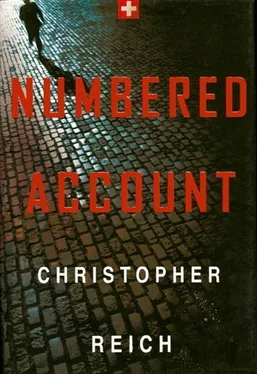He took a tram to the Burkliplatz and transferred there to a bus for the quarter-hour ride to Thalwil. Seestrasse 78 was easy to find. A pretty yellow stucco apartment building sitting on the main road, running parallel to the lake.
Nick found the name he was looking for at the top of a list of six. He pressed the buzzer next to it and waited. Not a soul stirred. He wondered if he should have phoned in advance, then decided that he’d been correct to come unannounced. This was not an official visit. He rang the buzzer again and a clipped voice spurted from the grate.
“Who is it?”
Nick jumped toward the speaker. “Neumann, USB.”
“USB?” asked the garbled voice.
“Yes,” said Nick, then he repeated his name. A moment later he heard a soft metallic click as the entry’s lock was released. He pushed open the glass door and entered the foyer, which smelled strongly of pine antiseptic. He crossed to the elevator and pressed the call button. Next to the elevator door was a small mirror. He leaned down and checked his appearance. Dark circles under his eyes broadcast a lack of sleep. Why are you here? he asked himself. To spite Maeder? To prove wrong Sprecher’s amoral drivel? Or was it to honor the unsubstantiated image he held of his father? Wouldn’t Alex Neumann have done the same thing?
Nick opened the elevator door and pushed the top button. Several announcements were posted on the wall. One read: “Please respect your assigned laundry day. No laundry may be done on Sundays. By Federal Ordinance.” Written in pen, under the declaration, was “No switching of assigned laundry days permitted.” And under that, “especially Frau Brunner!!”
The elevator buffeted lightly as it reached the top floor. Before Nick realized that it had stopped, the door was flung open and a short man, impeccably dressed in a double-breasted gray suit, fresh carnation pinned to the lapel, was grasping his hand and ushering him into the living room.
“Cerruti, es freut mich. Pleased to meet you. Come in, sit down.”
Nick allowed himself to be steered through a narrow corridor and into a spacious living room. A firm hand in the lee of his back gave him a polite shove toward the couch.
“Please have a seat. Good Lord, it’s about time you arrived. I’ve been calling the bank for weeks.”
Nick opened his mouth to explain.
“Don’t apologize,” said Marco Cerruti. “We both know Herr Kaiser wouldn’t permit it. I can imagine the bank is in an uproar. Konig, that devil. I don’t believe we’ve met. Are you new on the Fourth Floor?”
So this was the mysterious Marco Cerruti. He was an excitable man, mid-fifties by the look of him. His bristly gray hair was cut short. His eyes were neither blue nor gray. Pale washed-out skin hung on his face like a badly done job of wallpapering—tight here, sagging there.
“I don’t work on the Fourth Floor,” said Nick. “I’m sorry if you misunderstood me.”
Cerruti pulled up. “My mistake, I’m sure. You are…?”
“Neumann. Nicholas Neumann. I work in your section. FKB4. I began shortly after you became ill.”
Cerruti looked at Nick oddly. He bent his knees and inspected him carefully, like a critic would examine a particularly frantic work of Picasso or Braque. Finally, he placed his hands on Nick’s shoulders and stared directly into his eyes. “I don’t know how I could have missed it when you walked in. I heard your name but it just didn’t register. Yes, of course. Nicholas Neumann. My God, you look so like your father. I knew him. Worked under him for five years. Best time of my life. Sit still and let me fetch my papers. There are so many things we have to talk about. Look, eh? Fit as a fiddle and raring to go.” He turned a full circle, then dashed out of the room.
Finding himself alone, Nick surveyed his surroundings. The flat was furnished in somber tones, a style he would call antique Swiss Gothic. The colors were sober to the point of being morose. The furniture was clumsy and wooden. A picture window ran the length of the apartment and where not obscured by heavy calico drapes, offered a magnificent view of the Lake of Zurich. That afternoon a mantle of fog clung to the lake’s surface. A light drizzle fell. The world was textured damp, gray, and forlorn.
Cerruti bustled into the room carrying two notebooks and a stack of files. “Here is a list of clients Mr. Sprecher must call. Three or four had scheduled appointments with me before my absence.”
“Peter is leaving USB,” said Nick. “He’s been hired by the Adler Bank.”
“The Adler Bank? They’ll be the death of us.” Cerruti dropped a limp hand on his head and collapsed onto the couch beside his visitor. “Well, what have you brought for me? Let’s see.”
Nick opened the slim briefcase he had brought with him and extracted a manila file. “Sheikh Abdul bin Ahmed al Aziz has been phoning every other day. He sends his best personal regards. He wants to know how you are, where he can contact you. Insists that only your personal responses to his questions will do.”
Cerruti sniffed twice and blinked his eyes in rapid succession.
“The sheikh,” Nick continued, “is dead set on buying German governments. He has it on good authority that Finanz Minister Schneider will lower the Lombard rate any day now.”
Cerruti looked at Nick uncertainly. A great sigh left him, and then he laughed. “Dear old Abdul bin Ahmed. I call him Triple A, you know. Never could read economic data worth a damn. German inflation is rising, unemployment over ten percent, Abdul’s uncle is itching to raise oil prices. The only way interest rates can go is up, up, up!” Cerruti stood up and straightened his jacket. He pulled his sleeves from his jacket until a good inch of cuff showed. “You must tell the sheikh to buy German equities, pronto. Sell whatever German bonds he’s holding and put him into Daimler-Benz, Veba, and Hoechst. That should cover the major industrial groups and keep Abdul from losing his shirt.”
Nick wrote down his instructions verbatim.
Cerruti tapped Nick on the arm. “Neumann? No word from Kaiser’s office on my returning. Even on a part-time basis?”
So Cerruti wanted to come back? Nick wondered why Kaiser might be keeping him away. “I’m sorry. I don’t have any contact with the Fourth Floor.”
“Yes, yes,” Cerruti tried unsuccessfully to conceal his disappointment. “Well, I’m sure the Chairman will call me soon and let me know his plans. Carry on then, who’s next?”
“Another client is causing a fuss. I’m afraid it’s one of our numbered accounts, so I don’t know the name.” Nick made a show of searching for the account number among the papers on his lap. After all, he was only a trainee, he couldn’t be expected to match the mental acuity of Maestro Cerruti. He held up a sheet of paper. “Found it. Account 549.617 RR.”
“Can you repeat that?” whispered Cerruti. His blinking had gone haywire.
“Five four nine, six one seven, R R. I’m sure you recognize the number.”
“Yes, yes. Of course, I do.” Cerruti harrumphed. He fidgeted. His hands mangled each other. “Well, get to it, boy. What’s the problem?”
“Not a problem really. More an opportunity. I’d like to convince this client to keep more of his assets with us. In the last six weeks he’s transferred over $200 million through our accounts without keeping a dime of it overnight. I’m sure we can make some more money off of him than simple transfer fees.”
Suddenly, Cerruti was on his feet. “Stay there, Nicholas. No moving. No budging. I’ll be right back. I have something wonderful to show you.”
Before Nick could protest, he was gone. He came back a minute later with a spiral scrapbook tucked under his arm. He thrust the scrapbook into Nick’s hands and opened it to a spot kept by a leather bookmark. “Recognize anyone?” he asked.
Читать дальше












